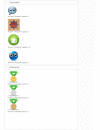The effect of social support features and gamification on a Web-based intervention for rheumatoid arthritis patients: randomized controlled trial
- PMID: 25574939
- PMCID: PMC4296094
- DOI: 10.2196/jmir.3510
The effect of social support features and gamification on a Web-based intervention for rheumatoid arthritis patients: randomized controlled trial
Abstract
Background: Rheumatoid arthritis (RA) is chronic systematic disease that affects people during the most productive period of their lives. Web-based health interventions have been effective in many studies; however, there is little evidence and few studies showing the effectiveness of online social support and especially gamification on patients' behavioral and health outcomes.
Objective: The aim of this study was to look into the effects of a Web-based intervention that included online social support features and gamification on physical activity, health care utilization, medication overuse, empowerment, and RA knowledge of RA patients. The effect of gamification on website use was also investigated.
Methods: We conducted a 5-arm parallel randomized controlled trial for RA patients in Ticino (Italian-speaking part of Switzerland). A total of 157 patients were recruited through brochures left with physicians and were randomly allocated to 1 of 4 experimental conditions with different types of access to online social support and gamification features and a control group that had no access to the website. Data were collected at 3 time points through questionnaires at baseline, posttest 2 months later, and at follow-up after another 2 months. Primary outcomes were physical activity, health care utilization, and medication overuse; secondary outcomes included empowerment and RA knowledge. All outcomes were self-reported. Intention-to-treat analysis was followed and multilevel linear mixed models were used to study the change of outcomes over time.
Results: The best-fit multilevel models (growth curve models) that described the change in the primary outcomes over the course of the intervention included time and empowerment as time-variant predictors. The growth curve analyses of experimental conditions were compared to the control group. Physical activity increased over time for patients having access to social support sections plus gaming (unstandardized beta coefficient [B]=3.39, P=.02). Health care utilization showed a significant decrease for patients accessing social support features (B=-0.41, P=.01) and patients accessing both social support features and gaming (B=-0.33, P=.03). Patients who had access to either social support sections or the gaming experience of the website gained more empowerment (B=2.59, P=.03; B=2.29, P=.05; respectively). Patients who were offered a gamified experience used the website more often than the ones without gaming (t91=-2.41, P=.02; U=812, P=.02).
Conclusions: The Web-based intervention had a positive impact (more desirable outcomes) on intervention groups compared to the control group. Social support sections on the website decreased health care utilization and medication overuse and increased empowerment. Gamification alone or with social support increased physical activity and empowerment and decreased health care utilization. This study provides evidence demonstrating the potential positive effect of gamification and online social support on health and behavioral outcomes.
Trial registration: International Standard Randomized Controlled Trial Number (ISRCTN): 57366516; http://www.controlled-trials. com/ISRCTN57366516 (Archived by webcite at http://www.webcitation.org/6PBvvAvvV).
Keywords: eHealth; experimental games; gaming; health care utilization; multilevel analysis; patient empowerment; physical activity; randomized controlled trial; rheumatoid arthritis; social support.
Conflict of interest statement
Conflicts of Interest: The author Ahmed Allam is the developer of the new version of ONESELF.
Figures




References
-
- World Health Organization. [2014-05-02]. Chronic diseases and health promotion: chronic rheumatic conditions http://www.who.int/chp/topics/rheumatic/en/
-
- Quadrello T, Bevan S, McGee R. Fit For Work? Musculoskeletal Disorders and the Swiss Labour Market. London: The Work Foundation; 2010. [2014-05-02]. 6PGYZRJ67 http://www.fitforworkeurope.eu/Downloads/Website-Documents/Ffw_E_23MAR20....
-
- Giustini D. How Web 2.0 is changing medicine. BMJ. 2006 Dec 23;333(7582):1283–4. doi: 10.1136/bmj.39062.555405.80. http://europepmc.org/abstract/MED/17185707 - DOI - PMC - PubMed
-
- Internet World Stats. [2014-05-02]. World Internet users and population stats http://www.internetworldstats.com/stats.htm.
Publication types
MeSH terms
Associated data
LinkOut - more resources
Full Text Sources
Other Literature Sources
Medical

